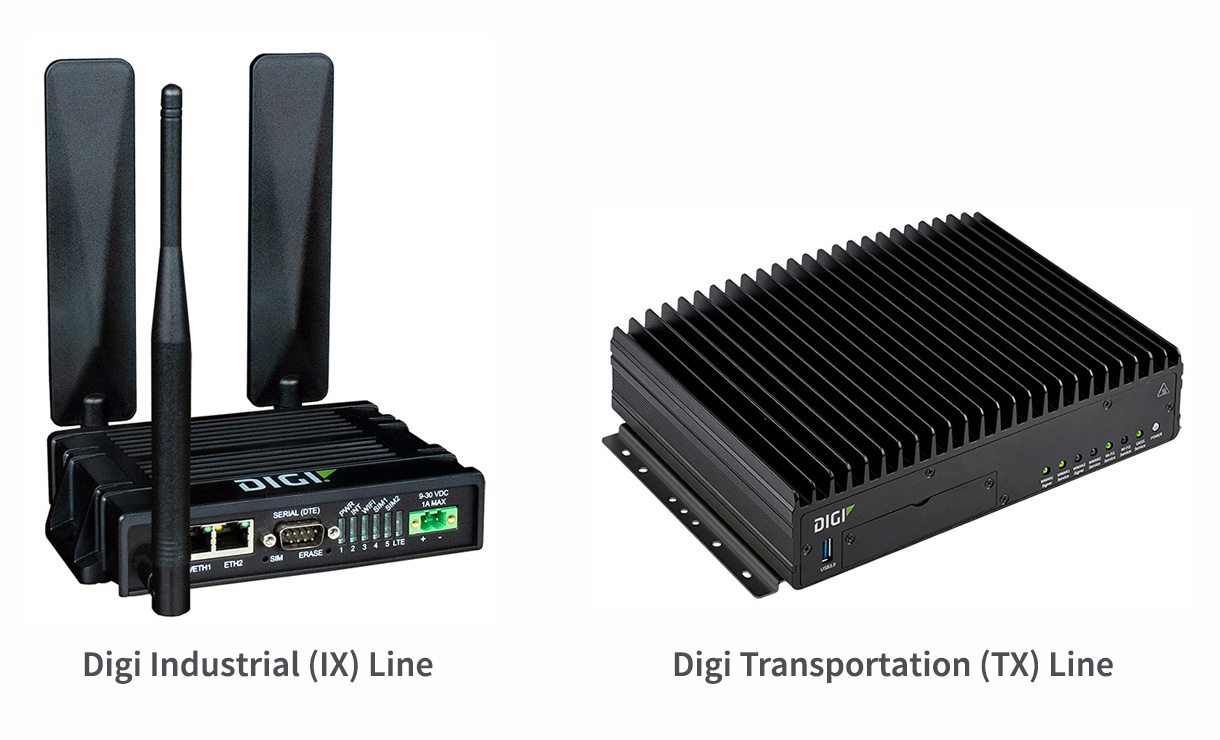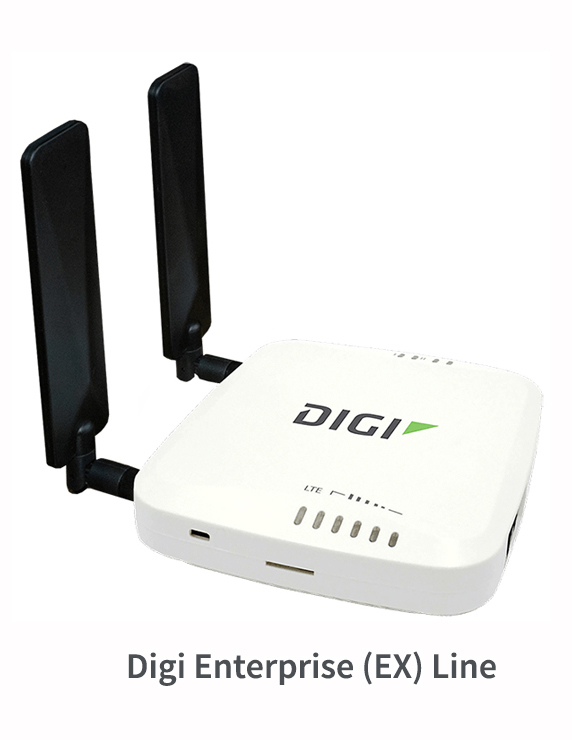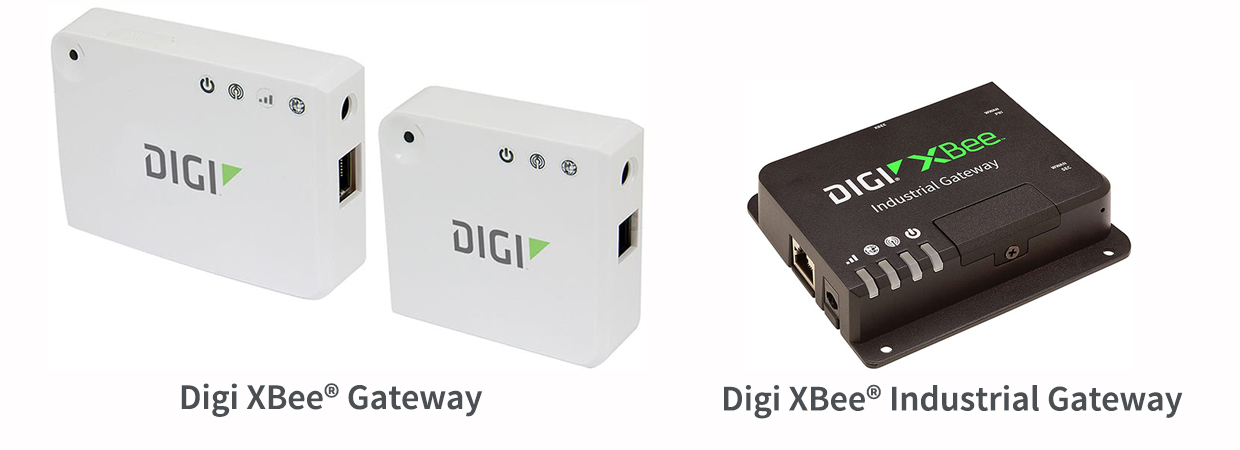Cellular routers, gateways and extenders have similarities and differences in an IoT deployment. For example, cellular routers manage all communications for connected devices. Cellular extenders can perform this kind of task, but also offer remote placement options and Power-over-Ethernet (PoE) to help optimize cellular performance. Finally, gateways provide translation between different protocols, and typically offer a data path to the Internet or a local network.
In this article we’ll examine the similarities, differences and use cases for cellular routers, extenders and gateways. While these three types of devices serve similar purposes, there can be considerable differences between them depending on how they are leveraged, and on their application requirements.
Digi experts are available to support you in determining the right solution based on your intended application, the operating environment, speed and throughput requirements and more.
Contact us if you need support to make the right selection or if you need help with site surveys, deployment planning and rollout.
What Does a Cellular Router Do?
A cellular router connects to a carrier network, then uses the signal it acquires to securely route data between attached LAN devices and end points, such as a corporate data center. It allows an enterprise or government entity to deliver a data connection virtually anywhere, while extending corporate security to the edge solution.
These devices come in a broad range of build specifications and robustness, depending on their intended use case. For example, Digi offers an
industrial grade (IX) router family that is hardened to tolerate conditions like dust and extreme temperature. The Digi
transportation (TX) router family is designed for mobile and smart city applications like public transit, traffic management and emergency response.

These cellular routers meet the needs of highly demanding applications and environments across a broad range of industries, and possess the features and capabilities required to support such applications.
For example, use cases like critical infrastructure, where stable connectivity is imperative, incorporate multiple SIM cards for cellular redundancy. This feature provides two key advantages:
- Connection availability: Some cellular routers are mounted in a mobile environment (e.g. ambulance), and depending on the location, one network may receive a better signal than another
- Failover: If the primary mobile network is unable to pass data traffic, a cellular router with dual SIMs can automatically connect to an alternate cell network, ensuring optimal uptime
Another critical feature of Digi cellular routers is that they’re capable of leveraging multiple network technologies. For example, Digi routers can connect to legacy 2G and 3G networks, as well as more modern 4G LTE and LTE-Advanced networks. The latest generation of Digi cellular routers is being built with 5G compatibility. While 5G coverage is still being rolled out to many areas, coverage is rapidly expanding. New Digi industrial and transportation routers can be leveraged for high-speed LTE-Advanced Pro performance, and you’ll be positioned to take advantage of it when 5G arrives in your area.
Here are a few common applications where Digi cellular routers are used:
- Energy: Cellular routers provide critical connectivity for utilities, as well as renewable energy such as wind and solar, and smart grid applications.
- Transportation: Cellular routers can be mounted in buses, trains, tractors and other vehicles to provide a data connection for the growing list of transit applications, including fare collection, passenger counters, telematics, digital signage, GPS and customer Wi-Fi.
- Traffic management: Today, cellular is replacing a multitude of older technologies, including copper, fiber and fiber with lower-cost and easier-to-deploy cellular connectivity.
- Industrial applications: These applications such as agriculture and construction, require routers with the most robust specifications. In certain cases such as oil refineries, factories or warehouses, it may be more practical to use a cellular router to create an Internet coverage. zone, or private LTE, versus trying to provide blanket coverage with traditional Wi-Fi
- Mining: It’s not uncommon for a mining company to be located in an area lacking access to traditional Internet infrastructure, and cellular routers provide can provide the critical connectivity through standard networks or CBRS (Citizens Broadband Radio Service).
- Digital signage: Digi industrial routers are constructed for outdoor applications and can survive tough conditions like extreme temperature and humidity, while ensuring maximum internet uptime.
More information on Digi cellular routers, including a list of all of our available cellular router solutions, can be
Digi's cellular routers page.
What Does a Cellular Extender Do?
A cellular extender is similar to a cellular router, and can provide virtually identical functionality. Digi cellular extenders offer full-featured connectivity to enterprise applications, such as climate-controlled digital signage. A key feature of Digi cellular extenders is the ability to remotely mount the unit for optimal cellular performance, then connect back into a data center via PoE.
.jpg?lang=en-US&width=375&height=485)
Many different types of enterprises, from business offices to retail stores and bank branch offices all have certain needs and requirements for network reliability and uptime, and Digi designs the Enterprise (EX) line to this market. For instance, the following are some of the features of one of our newest enterprise cellular extenders, the
Digi EX12.
- Dual SIM cards ensure redundancy in case the primary cellular network goes offline
- Ethernet connectivity is optimized for high-bandwidth enterprise demands
- Digi Remote Manager® software platform makes setup and configuration easy
- Mounting kits simplify the process of installing enterprise extenders
- Maximum device security and data privacy are achieved with Digi TrustFence®
While a cellular router and an enterprise-level extender share the same basic functionality, specific features set apart a cellular extender, as these units are designed to readily connect in climate-controlled environments with potential obstructions like walls, doors and pillars. You can learn more about the Digi Enterprise
extender line for enterprise connectivity on
Digi.com.
What Does a Cellular Gateway Do?
Although a cellular gateway connects to a network it has a very different purpose than a cellular router. A cellular gateway typically acts as an “aggregator” and translator for device data. For example, a gateway can collect information from dozens of field devices (like Digi
XBee® modules) and convert that data into IP protocol and send it via cellular network. Thus a cellular gateway’s most important function is protocol translation. A gateway can take protocols like Zigbee, Wired HART or Modbus, and translate that data into a format that can be easily sent over a wireless network.

Gateways are usually simpler devices than routers, in that they may lack more sophisticated networking traffic controls or other advanced features. That’s why gateways are often used in conjunction with other devices to deliver a final solution. Because of their simplicity and onboard programming capabilities, gateways are typically easy to set up and operate. Gateways are also designed to be highly scalable, allowing numerous devices and sensors to connect to a single gateway. See Digi's
Gateways page for additional information and resources.
Defining the Difference in Connectivity Devices
When you break it down it’s fairly easy to see the differences between a cellular router, an extender and a gateway. Each device has its best use cases, and customers are wise to perform a needs analysis when making a selection. Digi representatives are always available to assist with this process.
Contact us if you are seeking help with needs assessment, site surveys, and selection of the right connectivity for your use case. No matter what your cellular connectivity needs may be, we’ve got a solution that will work for you, along with services teams to support application development and deployment.